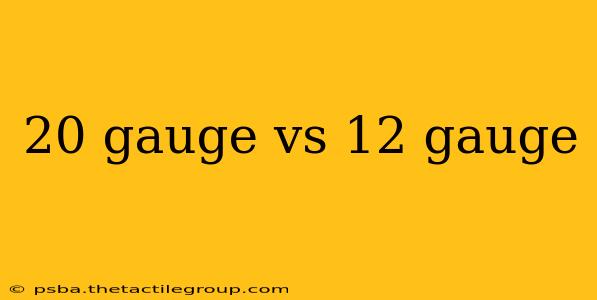Choosing between a 20-gauge and a 12-gauge shotgun is a common dilemma for both novice and experienced shooters. The decision hinges on several factors, including intended use, physical capabilities, and personal preference. This in-depth comparison will help you weigh the pros and cons of each gauge to make an informed choice.
Gauge Explained: Understanding the Numbers
Before diving into the specifics, it's crucial to understand what "gauge" signifies. The gauge number indicates the number of lead balls, each with a diameter equal to the inside diameter of the barrel, that would weigh one pound. Therefore, a 12-gauge shotgun has a larger bore diameter than a 20-gauge, meaning it fires a larger shot.
12 Gauge: The Workhorse
The 12 gauge is the most popular shotgun gauge globally. Its popularity stems from its versatility and power.
Advantages of 12 Gauge:
- Power: The larger bore diameter translates to significantly more power, making it ideal for hunting larger game like deer, turkey, and waterfowl at longer ranges.
- Availability: Ammunition for 12-gauge shotguns is readily available virtually everywhere, in a wide variety of loads and shot types.
- Variety of Uses: Suitable for hunting, sport shooting (like trap, skeet, and sporting clays), and home defense.
- Recoil Management Options: While recoil can be substantial, advancements in technology offer recoil-reducing stocks and lighter-weight shotguns to mitigate this.
Disadvantages of 12 Gauge:
- Recoil: The significant recoil can be challenging for smaller or less experienced shooters.
- Weight: 12-gauge shotguns tend to be heavier, leading to fatigue during extended shooting sessions.
- Cost: While ammunition is widely available, it can be slightly more expensive per round compared to 20-gauge.
20 Gauge: The Lighter Alternative
The 20-gauge shotgun offers a compelling alternative for many shooters, especially those prioritizing reduced recoil and weight.
Advantages of 20 Gauge:
- Reduced Recoil: Significantly less recoil than a 12-gauge, making it more comfortable for smaller shooters and those new to shotguns.
- Lighter Weight: Generally lighter than 12-gauge shotguns, reducing fatigue during prolonged use.
- Improved Handling: The lighter weight and reduced recoil contribute to better handling and quicker target acquisition.
- Cost-Effective Ammunition: Ammunition is typically less expensive per round than 12-gauge.
Disadvantages of 20 Gauge:
- Less Power: The smaller shot size results in less stopping power, potentially limiting its effectiveness for hunting larger game at longer ranges.
- Limited Ammunition Variety: While readily available, the variety of ammunition types and loads isn't as extensive as that for 12-gauge.
Choosing the Right Gauge: A Practical Guide
The best gauge for you depends heavily on your needs and physical capabilities:
- For experienced shooters hunting large game at longer ranges: The 12 gauge is generally the preferred choice.
- For smaller or less experienced shooters, or those prioritizing comfort and lighter weight: The 20 gauge is an excellent option.
- For hunting smaller game or upland birds: Both gauges are suitable, with the 20-gauge offering a more comfortable shooting experience.
- For home defense: Both gauges can be effective, but the 12 gauge offers more stopping power. Consider the recoil implications, though.
Ultimately, the best way to decide is to try both gauges if possible. Rent or borrow different models to experience the differences in recoil, weight, and handling firsthand. Consider your shooting style, physical abilities, and intended use to make the most informed decision. This will ensure you select the shotgun that best suits your needs and enhances your shooting experience.

